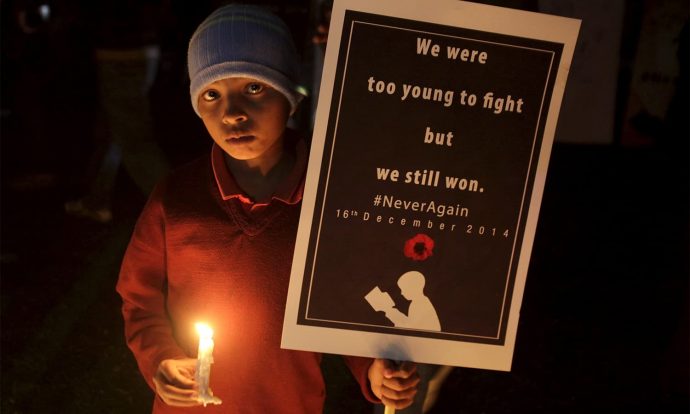
Marking 10 years today on the APS tragedy: A traumatization Pakistan just can’t get over!
The attack on the Army Public School (APS) on December 16, 2014, was the province’s worst nightmare as it became the centre of terrorist activity. More than 140 people were killed that morning ten years ago when a group of terrorists stormed in and opened fire on instructors and students.
Khyber-Pakhtunkhwa (K-P) and all of Pakistan were crippled by the systematic carnage that ensued. Mosques crowded with mourners bearing little coffins and sobbing family members were a familiar sight in Peshawar. The city was experiencing its biggest tragedy and nightmare. Many people are still in shock, mostly on an emotional level, even though the city and the nation won their fight against terrorism soon after the APS attack.
In addition to leaving a lasting impression on the family members, the APS tragedy also had a lasting impact on people who watched the incident on television. Additionally, many people have been found to be secretly suffering from post-traumatic stress disorder, and many of them have not recovered despite government promises to provide psychological care.
The government pledged to construct a cutting-edge trauma hospital in Peshawar shortly after the attack. However, this promise was also intended to be broken, just like all others. The people who were in pain received assistance from unexpected sources. To assist individuals still in shock over the APS tragedy, a vast army of volunteers banded together.
Volunteers are offering counselling services to survivors, the families of those killed, and anyone else who suffers emotionally as a result of the attack, even though the government has yet to offer psychological support to those experiencing mental trauma in the wake of the APS tragedy.
Social media will always remember the APS tragedy.
Dr. Khalid Mufti, a consultant psychiatrist, stated, “We have received people who are suffering directly and indirectly as a result of the attack.”
Peshawar has recently had horrific attacks, but the APS went beyond human endurance to such an extent that the military began a full-scale offensive to eradicate terrorism that targeted Pakistan’s most vulnerable citizens.
The terrorists lost, and the troops prevailed. However, the post-APS battle has been a protracted and never-ending one for the people of Peshawar. According to Dr. Mufti, counselling is necessary for all those who witnessed the horrific atrocity.
“Not just APS survivors or their families, but everyone who was told about the attack or watched it unfold on their screens needs help,” Dr. Mufti stated. It was difficult to reintegrate individuals who are still suffering. A vast army of volunteers, including journalists, religious leaders, educators, and general practitioners, join Dr. Mufti.
Dr. Mufti has treated over 150 patients thus far. Survivors, family members, and anyone who were impacted by the incident indirectly are on the list.
“Initially, siblings and family members of those who had died were reluctant to talk,” stated Dr. Mufti. “They were defensive and perhaps feared everyone who wanted to talk about the attack,” said the doctor.
Those who survived would always remember December 16 in a notorious way. Pakistan will always be reminded of the day’s devastation and death. Numerous lives were lost as a direct or indirect result of the tragedy and agony. According to Dr. Mufti, many people experienced cardiac arrest because the tragedy was too much for them to handle.
After all these years years, Dr. Mufti and his volunteers are still facing significant challenges. He said that many survivors relapse on December 16 of each year.
“We have no option but to start from where we were many years ago,” he said.
Bloodshed and unending grief for the families who lost loved ones were the results of the attack on the Army Public School. Survivors are reminded of the horrific incident that captured the world’s attention around this time of year.
Even after all these years, the pictures from the eight-hour rampage are still vivid. Dr. Mufti feels insecure at times, even as he is treating patients.

Content writer, educationist, teacher, researcher, social media manager, and a SEO manager from lahore. She has been working as a freelance academic and non-academic writer for more than 20 years now. She has a passion to learn new things and has a knack for writing and she combines both things to produce write ups she pours her heart out in.

